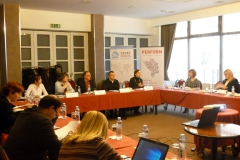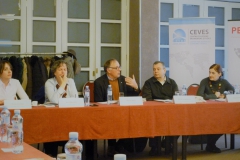February 14th, 2018
The Center for Advanced Economic Studies held a workshop on Tuesday, February 13, 2018, entitled “How Quality of Economic Growth Works on Human Development”. The workshop was held within the project “Using the Sustainable Development Goals as a Guide to Redirecting Social Sciences Research: A Pilot Project” which supports the PERFORM project (PERFORM is a project of the Swiss Agency for Development and Cooperation implemented by HELVETAS Swiss Intercooperation and the University of Freiburg), as a part of the wider “Preparatory Project Platform for Social Dialogue on Sustainable Development Goals in Serbia” supported by the Swiss Agency for Development and Cooperation. With this workshop, CEVES started the process of improving the knowledge about the quality of economic growth needed in the program of support of nationalization and monitoring of the goals of sustainable development.
The workshop was opened by Martin Dietz, Manager of PERFORM and Kori Udovički, President of CEVES, with introductory presentation. Mr. Dietz pointed out that social sciences have a lot to offer in terms of options for solving critical social problems and that PERFORM’s goal is to support the strengthening of a community of social science researchers in Serbia. With the support of CEVES, PERFORM wants to reinforce the bridge between knowledge and institutions and create an active civil society where the goal of all stakeholders is focused on solving certain challenges and / or problems. Ms. Udovicki, with gratitude to international partners, emphasized that we want to help the process of nationalizing the goals of sustainable development, because we believe that through them we can assess and achieve the right development that we need. Given that there are many fields that require efficient operation, the goal of the platform should be to determine the priority things to focus on. A dialogue should also be made on how to make the development inclusive and sustainable.
Danijela Bobić, Program Director of CEVES, then presented the results of research on the legalities in the recent performance of the real sector of Serbia. The aim of the presentation was to show that, behind the lush growth of GDP, a stronger growth of the new economy (greenfield foreign direct investment, and domestic small and medium-sized companies) took place in the previous period, along with the collapse of the traditional sector. They talked about patterns of growth and factors that influence the competitiveness of the Serbian economy, but the question of how sustainable patterns of sustainable growth are and what to do to make it sustainable and inclusive.
Professor Mihail Arandarenko, Chairman of the Board of Directors of the Foundation for the Development of Economic Science, presented the results of the research on inequality in Serbia. It was pointed out that Serbia has the highest inequality of income among all EU members. The transition has brought a lot of job losses, and although the number of employees returns, it must be borne in mind that formal, good, high-quality employment has not returned. Changes in status in the labor market are spreading to inequality of earnings. One of the recommendations is that the potential effects of reforms on inequality and poverty prior to their adoption must be systematically assessed, as well as the consequences of reforms after their adoption.
At the end of the opening speeches and held presentations, a discussion was opened in which many topics related to economic growth and human development, from the measurement of the efficiency of public policies, promotion of policies and association of local actors for economic growth, gender economic policy and women’s entrepreneurship to institutions which should implement the goals of sustainable development and educational policy issues. CEVES thanked all participants in the discussion on the contribution of the workshop, inviting us to continue and deepen the joint dialogue in the upcoming period.








 SR
SR